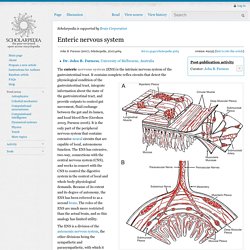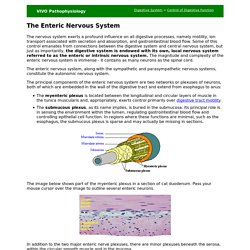

Enteric nervous system. Figure 1: caption here.

The enteric nervous system (ENS) is the intrinsic nervous system of the gastrointestinal tract. It contains complete reflex circuits that detect the physiological condition of the gastrointestinal tract, integrate information about the state of the gastrointestinal tract, and provide outputs to control gut movement, fluid exchange between the gut and its lumen, and local blood flow (Gershon 2005; Furness 2006). It is the only part of the peripheral nervous system that contains extensive neural circuits that are capable of local, autonomous function. The enteric nervous system and... [Nat Rev Gastroenterol Hepatol. 2012. The Enteric Nervous System. The nervous system exerts a profound influence on all digestive processes, namely motility, ion transport associated with secretion and absorption, and gastrointestinal blood flow.

Some of this control emanates from connections between the digestive system and central nervous system, but just as importantly, the digestive system is endowed with its own, local nervous system referred to as the enteric or intrinsic nervous system. The magnitude and complexity of the enteric nervous system is immense - it contains as many neurons as the spinal cord. Think Twice: How the Gut's "Second Brain" Influences Mood and Well-Being. As Olympians go for the gold in Vancouver, even the steeliest are likely to experience that familiar feeling of "butterflies" in the stomach.

Underlying this sensation is an often-overlooked network of neurons lining our guts that is so extensive some scientists have nicknamed it our "second brain". A deeper understanding of this mass of neural tissue, filled with important neurotransmitters, is revealing that it does much more than merely handle digestion or inflict the occasional nervous pang. The little brain in our innards, in connection with the big one in our skulls, partly determines our mental state and plays key roles in certain diseases throughout the body. Enteric nervous system.